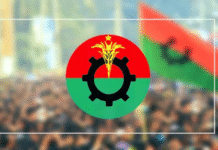Shahid Islam
Neither the government, nor the people are attentive to what they must do and what must be abstained from. The social contract between the government and the governed is full of cracks and vulnerabilities. To be candid, it’s on the throes of total rupture.
The implicit agreement between the rulers and the ruled plays about effectively if the system is efficacious and functional; when the guiding principles and the codes of conduct are complied with by both sides. Besides, the government’s ability to govern effectively depends on its honest intent to deliver so that the governed too may reciprocate likewise, graciously.
Evolving scenarios
The following examples of recent days illustrate amply that the social contract has broken down in today’s Bangladesh and anarchy is reigning supreme.
One: In a country where the executives and the judiciary spared no time to execute a constitutional amendment to undo the populist and much needed caretaker system based on an ‘implicit court order’, without waiting for the full text of the verdict to become handy, ministers are now allowed to go on with their responsibilities after the court found them guilty of crimes involving moral turpitude and breach of oath.
Two: Attacks on voters, allegedly not voting for the ruling party candidates in the ongoing local elections, are not censored or investigated while rape and murder occur randomly, including in the most secured area like military garrison.
Three: Money is stolen from the central bank’s reserve fund by a bunch of miscreants who had already stolen over 3,000 crores taka from other financial institutions in the last six years, according to a recent newspaper exposure.
Four: While celebrating the Independence Day, the name of the commander in chief of the war of liberation is not even mentioned for a minute, let alone the other war heroes who’d fought and brought freedom to this nation.
Of the myriad of such criminal propensities and decaying of values, the above-cited ones are of recent days. Cumulatively, thousands have died in the hands of ruling party thugs and the law enforcers over the recent years to ensure that this nation is governed by the rule of law by a government that is representative in nature and hoisted to power through a credible and fair election. Had the rule of law been in motion, over 80,000 political dissenters wouldn’t have rotten in prison.
Democracy vs. rule of law
Democracy and rule of law are like the Siamese twain. And, election being at the heart of democracy, how does one ensure that an election is fair and credible to further ensure that governance is consummated through rule of law?
This nation had dabbled with this quandary for too long, and, since independence in 1971, all the elections were found flawed due to the arbitrary acts of the ruling parties, proffering rigging of votes by stuffing ballot papers in favour of their own candidates, with help from the partisan law enforcers.
Although this malpractice eventually gave birth to the caretaker system in the 1990s, and few less disputed elections took place in 1991, 1996 and 2001, the nation is back again to square one.
It’s not a tad irony that, when the 15th amendment to the constitution was enacted on June 30, 2011, the full text of the court verdict, based on which the amendment came into force, was yet to be written or delivered by concerned judges. It still puzzles many why the 15th amendment had to occur in such a hurry?
It’s an oxymoron that some convicted ministers must wait now for a full verdict of their case, relating to committing contempt of the court, in order to decide whether they should remain as ministers or quit.
Such contradictions may seem apparent or real. But they’re more real than apparent. The epic court’s recent decision to quash a 1988-initiated writ, challenging the validity of Islam as the state religion, constitutes a virtual referral of the matter to the law makers who must remove the anomalies involving the revived tenet of secularism in Article 12, vide the 15th amendment, with the Islam remaining the state religion.
Above all else, many ruling party politicians, including the PM, have meanwhile contradicted their own assertions that the ‘adherents to secularism are a majority’ by positing that ‘changing the state religion epithet from the constitution will hurt the sentiment of majority Muslims of the nation.’
Concentration of power
Such runaway, hybrid contradictions aside, the total breakdown of the rule of law stems from the concentration of power in the hand of one person, i.e. the prime minister, in breach of Article 7 (of the constitution) that had empowered the people with all the powers.
The fact that the people are not allowed even to freely talk, assemble, contest in elections and seek mandate of the voters to govern locally and nationally is another major anomaly that must be removed first to reinstate some semblance of law and order in a society spiraling faster down the precipice of anarchy.
Unless such basic anomalies are addressed first, all the telltale signs indicate that a giant sleeping volcano will gallop faster toward a disastrous eruption.
Such a precipitous rotting of the social contract started with the January 2014 general election in which majority of ruling party candidates got elected unopposed. Ever since, the cycle trotted toward a completion through the ubiquitous deprivation of opposition candidates and voters, of the much craved label playing fields, and forcing most of them not to vote, or vote for ruling party candidates only.
Had that not been the case, what else explains why hundreds of voters lay hospitalized in Barisal and, hundreds of minority houses faced ransacking in Sathkhira only days ago. No less alarming is the situation in all other places where the staggered UP elections took place.
Stem dissenting voices
Much of such decadence in the law and order situation, and, the acute crisis of governance, sprang from this flawed democratic theatrics that the incumbent AL regime had orchestrated nationwide over the years.
This evolving, dreadful spectacle has been succinctly encapsulated by Brad Adams, the Asia director of the Human Rights Watch, who said: “There is no effective political opposition in (Bangladesh) parliament because the main parties chose not to participate. But now, the Sheikh Hasina government seems determined to stem all dissenting voices – even the ones outside the parliament.”
This gradually-evolved, one person, one party prescription had brought disaster to this nation in the past, and its recurrence is scaring all at home and abroad. An inclusive general election may not be the panacea to all the ills facing the nation, it will at the least put a strong lead on the impending volcanic eruption that stares around with demonic demeanours.
Source: Weekly Holiday









